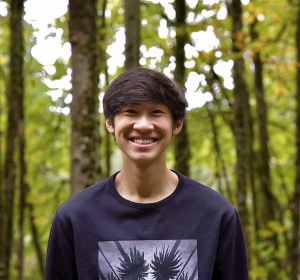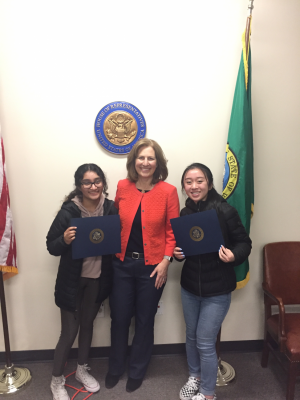Challenge accepted: Liberty students compete in programming contests
November 24, 2020
T-minus 60 minutes and the software is almost complete. Fingers flying across the keyboard, senior Philip Vu is racing to finalize the app’s code. Senior Kathie Huang is making final edits to the team’s application video, and senior Madhavi Vivek is scouring the internet, researching case studies and target audiences to perfect the group’s application responses.
Fast-forward 30 minutes and the team of programmers is still toiling away at their entry. The video is uploaded, the question responses entered, and the coding submitted. After 24 hours of hard work, the team can rest and await the results.
For Vu, Huang, and Vivek, this fast-paced collaboration is typical during their 24-hour or 48-hour programming and software development competitions, dubbed “hackathons.” In each hackathon, the participants receive a prompt or theme to follow and then are given an allotted amount of time to design, program, and submit an app.
Vu was introduced to the idea of hackathons last year when he stumbled across the profile of a student programmer living on the East Coast. He decided to try his hand at a hackathon and proceeded to recruit a team.
“Philip approached me initially, and I asked Madhavi to join us,” Huang said. “We became a trio, and we started competing in hackathons.”

Photo courtesy of Philip Vu
During one of these hackathons, the team—along with juniors Victor Nguyen, Paige Gyutoku, and Jacob Rubenstein—developed a video calling platform called “Chatter” and received third place in the competition.
“We worked really hard and ended up making a hundred dollars off of it, so that was pretty cool. It’s also why Chatter is my favorite of our apps,” Huang said.
But these hackathons aren’t the only example of how these three students have gone above and beyond to pursue their passion for computer science (CS).
“I work as both a mobile and web app developer for two organizations at the moment—part-time and remote,” Vu said.
Vivek and Huang have also explored CS both inside and outside of the classroom. For one, they are the co-founders of Liberty’s Girls Who Code club. Vivek has also taken or is currently taking every CS-related course that Liberty has to offer. Huang on the other hand, is relatively new to the subject. While many students spent their quarantines catching up on Netflix shows or perusing social media sites, Huang decided to teach herself CS.
“Over the summer I tried learning to code by myself. I took an intro to CS course by Harvard, and I also took a Java course so that I could take Advanced CS without being behind my peers,” Huang said. “I’m taking AP Computer Science A and the advanced computer science class simultaneously this year.”
Overall, these three ambitious students have come together to create an impressive programming team.
“The experience of working with a team is a lot more fun than working by myself. We like to joke around a lot, and we get along well,” Vu said.

Photo courtesy of Madhavi Vivek
As the lead programmer, Vu is tasked with delegating assignments to the other two. Whether that’s designing a logo, working on user interface for the front-end pages of the app, or responding to the questions that make up part of their entry, he knows he can rely on his teammates to get their work done in time. Both Vivek and Huang agree that Vu makes these competitions into learning experiences for them as well.
“Philip has been a good leader for our team; he pushes us to challenge ourselves and what we can do in computer science and programming apps,” Huang said. “He helps us work on the app but also learn from what we do.”
The team’s latest conquest has been entering the Congressional App Challenge (CAC), a prestigious legislative district-specific competition designed to encourage students to become more involved in programming and STEM.
The trio’s app for this year’s CAC is called HealthNut. The idea behind HealthNut was inspired by several of their previous hackathon entries.
“The app offers three main components: a health forum to voice concerns and get answers, a video calling service to contact health professionals, and an AI machine learning tool to diagnose Covid-19, pneumonia, and melanoma from images of chest x-rays,” Vivek said.
This January, HealthNut will be judged by former physician Kim Schrier, who is the house representative for District 8.
“We worked very hard throughout the summer entering hackathons to strengthen our knowledge in app development. With the experience from summer and our team connection, we were able to develop one of our best projects yet,” Vivek said. “I believe we will do pretty well in this year’s competition because we have created an app that tackles a very relevant problem in our society today.”


